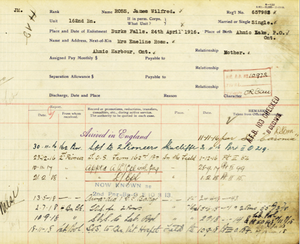ROSS, PTE. JAMES WILFRED ‘BILL’ Regimental #657982
James Wilfred ‘Bill’ Ross was born March 21, 1895 to Charles and Emmeline (Neely) Ross of Ahmic Harbour.
 At right, William Ross standing, George 'Ernie' Ross sitting on right, Pte E. Cooke on left
At right, William Ross standing, George 'Ernie' Ross sitting on right, Pte E. Cooke on left
James Wilfred Ross is identified as having enlisted April 24, 1916 at Burks Falls in the 162nd.
In his Discharge Certificate Bill is identified as having enlisted in the 162nd on April 24, 1916 in Burks Falls and as having served in France and Belgium.
He was discharged April 26, 1919.
He arrived in England on November 11, 1916 on the SS Caronia and by month’s end had been assigned to the 2nd Pioneers. He landed in France in January of 1917
In late September/early October 1917 he was appointed as Acting Lance Corporal.
Below is a note on Bill’s medical record indicating that he “had gas” in July, 1917 – but that he had remained on duty.
In June, 1918 he was transferred from the 2nd Pioneers to the 4th Battalion, Canadian Engineers. On July 11, 1918 he again was gassed and was hospitalized.
His condition as a result of the 2nd gassing is identified below
According to his service record, later in August, 1918 he was deployed to the Cdn. General Base Depot.
Bill Ross was injured (gas) during a major German offensive that began in March of 1918. As described by the Canadian War Museum in “The German Offensives of 1918”: “Russian withdrawal from the war, due to internal revolution and defeat on the battlefield, allowed German forces to mass on the Western Front. With the United States now in the war and sending a seemingly endless supply of troops overseas, Germany attempted to win the war with a knockout blow before the untrained Americans became an effective force. On 21 March 1918, the German offensive began, spearheaded by specially trained ‘storm troopers’ and savage barrages of gas and high explosive shells. The attack mauled two British armies and overran thousands of stunned Allied troops. Later assaults struck Belgian, British, French, and American forces at strategic points from the English Channel to the Marne River, east of Paris.”
After the war, William departed Liverpool on the SS Belgic and arrived in Halifax April 23, 1919.He was discharged Aug 26, 1919. He continued to have chronic bronchitis on discharge.








